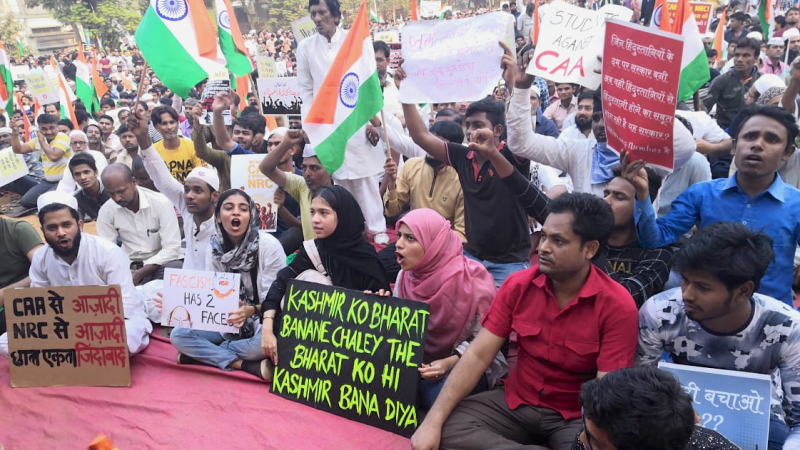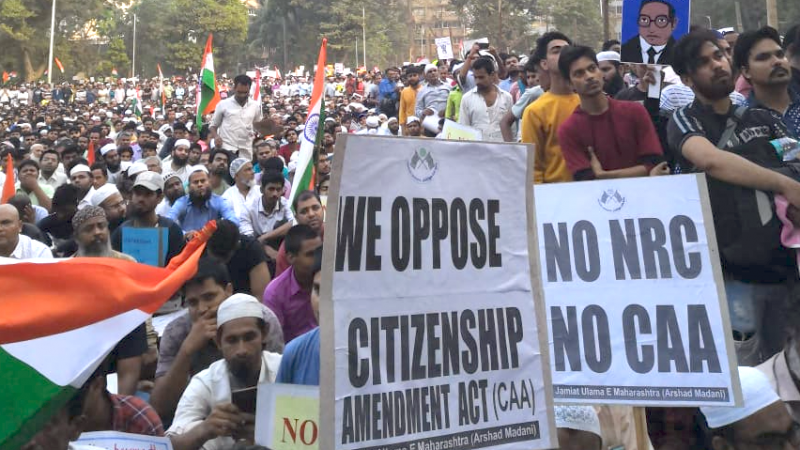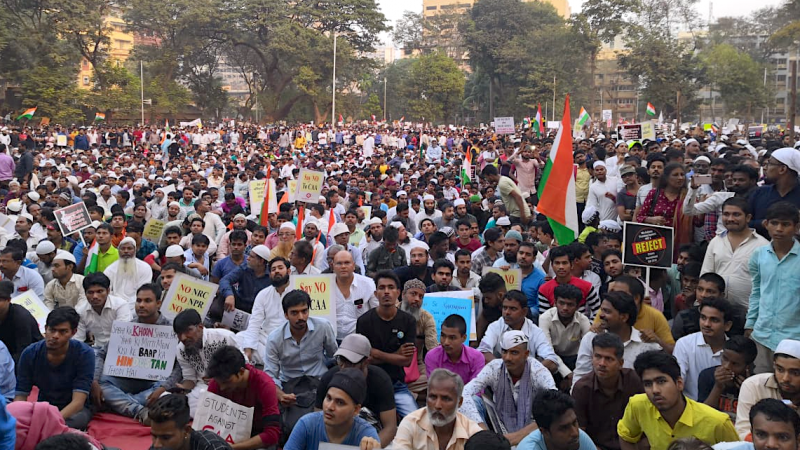Thousands of protestors detained across India and hundreds imprisoned

Protests against the Citizenship Amendment Act (CAA) and the National Register of Citizens (NRC) in Mumbai. December 19, 2019. Photo by Vishal Yashoda, CC-BY
As of December 27, 2019, at least 27 people have been killed and thousands have been arrested amid demonstrations in India against the Citizenship Amendment Act (CAA), a new law that allows immigrants of religious minorities in Afghanistan, Pakistan, and Bangladesh to seek Indian citizenship while excluding Muslims from that prerogative.
Passed in early December, the new law has put India's 200 million Muslims on high alert and joins a growing list of controversies spurred by the Bharatiya Janata Party-led government, which is accused of pushing a Hindu-nationalist agenda. Critics say that the CAA undermines India's secular 1949 Constitution which ensures equality for all religions.
Mass demonstrations have engulfed both large and small cities nationwide, including Mumbai, New Delhi, Lucknow, Bangalore, and Malegaon. Authorities have responded with a brutal crackdown, as well as restrictions on street protests and internet shutdowns.
Read more: Indian police accused of brutality after violently dispersing student-led anti-CAA protest in Delhi
“A total of 5,400 people have been taken under custody till now and around 705 have been sent to jail.
The government is also expected to invoke the National Security Act (NSA) against 250 agitators”https://t.co/Dhxi5zhCAQ
— Asim Ali (@AsimAli6) December 26, 2019

Protests against the Citizenship Amendment Act (CAA) and the National Register of Citizens (NRC) in Mumbai. December 19, 2019. Image by Vishal Yashoda, CC-BY.
In August 2019, the BJP-led parliament abrogated the autonomy status of Muslim-majority state Jammu and Kashmir, which has since been subjected to curfews, restrictions on public transportation, and a near-total blackout.
On November 9, 2019, the Supreme Court ruled in favor of the government in the Ayodhya dispute of 1992 when Hindu radicals razed down the Babri Mosque in Uttar Pradesh, leading to nationwide violence between Hindus and Muslims. The final verdict ordered the contested land to be hand over to the government for building a Hindu site.
Read our special coverage: Inside Kashmir's crisis
Another upcoming controversial measure by the BJP is the National Register of Citizens, a comprehensive database of every Indian resident. Critics fear that the purpose of this list is to identify “undesirable” and force them to prove their right to Indian citizenship. The recent construction of detention centers in the Western state of Maharashtra have raised suspicions that the government plans to arrest citizens without documentation identified by the NRC. Similar mass detention centres have been rolled out in Assam state and constructions are underway.
Amid the CAA protests, the BJP secured funds to go ahead with the database, although Prime Minister Narendra Modi said the matter is still under study.
The BJP party is currently facing opposition to the Citizenship Act from 10 state governments, including Punjab, West Bengal, Kerala, Maharashtra, and Jharkhand.
Police crackdown
German citizen Jakob Lindenthal, who was studying at IIT Madras in Chennai, attended a recent protest carrying a sign that referenced Nazi rule in his country between 1933 to 1945 (“we have been there,” the sign read). After a photo of the placard made waves on social media, Lidenthal was asked to leave India for “violating visa norms.”
As he arrived home, Lidenthal posted a message on Facebook expressing solidarity with protesters and concern for the deterioration of civil rights in the world's largest democracy:
Jakob Lindenthal, the German student expelled from IIT Madras has a message for us all. pic.twitter.com/CxGnlKyfGK
— Akif عاکف (@khaans) December 25, 2019
Indian Nazis, #RSS today took a massive Nazi style march in South Indian city, Hyderabad! pic.twitter.com/HqXQhH5Gwb
— Ashok Swain (@ashoswai) December 25, 2019
Editor's note: Rashtriya Swayamsevak Sangh (RSS) is an Indian right-wing, Hindu nationalist, paramilitary volunteer organisation linked to the ruling party of India, the Bharatiya Janata Party.
Prominent historian Ramachandra Guha was among the people arrested during the protests in the city of Bengaluru:
Historian Ramachandra Guha is among the protestors who came in waves to Town Hall, Bengaluru and were detained. pic.twitter.com/yRY45drPU2
— Prajwal (@prajwalmanipal) December 19, 2019
Internet shutdowns have been reported in the capital Delhi and, according to Access Now, the block was ordered by India's Ministry of Home Affairs:
Reports indicate that the Special Branch of the Delhi Police — controlled directly by the Government of India’s Ministry of Home Affairs — ordered service providers via a letter to suspend internet connections.
Read This: Internet blocked as protests intensify in northeast India against the Citizenship Amendment Act
These are the #InternetShutdowns in #UttarPradesh right now. Please note that the list is not exhaustive and we will keep adding to it.
Agra
Mathura
Saharanpur
Ghaziabad
Firozabad
Bijnor
Sitapur
Bulandshahr
Meerut
Aligarh
Muzzafarnagar
Sambhal
Kanpur#LetTheNetWork— InternetShutdowns.in (@NetShutdowns) December 26, 2019
Amidst the internet shutdowns, offline messaging apps like Bridgefy, FireChat, among others, have gained popularity.
Several incidents of stone-pelting by protesters and heavy-handedness by police officials have surfaced on social media. In Uttar Pradesh, authorities allegedly confiscated land and other private property of Muslim citizens. Over 17 people have died in protests in that state alone.
Locals in UP's Bijnor have alleged that after protests over CAA, the UP Police has been vandalising homes, harassing women and threatening children to disclose the location of the male members of their families. A current offline ground report from Bijnor
https://t.co/c6P4KjhlRa— Indias Muslims (@IndiasMuslims) December 24, 2019
Many protesters are also being sued:
FIR against 1,200 AMU students for carrying out candlelight march | City – Times of India Videos https://t.co/dWCmflcuZZ
— Rana Safvi رعنا राना (@iamrana) December 25, 2019
Note: FIR = First information report.
Global solidarity
There have been protests against the Citizenship Amendment Act abroad as well, including in London, New York, Paris, Tokyo, and others.
In the period between December 17 and 19, hundreds of Indian students from institutions such as Oxford, Harvard, Cambridge, Columbia, University of Massachusetts, and many others organised peaceful protests against the CAA.#CAA_NRCProtestshttps://t.co/GDeGVW2hDn
— The Wire (@thewire_in) December 24, 2019
They have raised their voices in solidarity with Indian protesters and against the violence in Jamia Millia University.

Protests against the Citizenship Amendment Act (CAA) and the National Register of Citizens (NRC) in Mumbai. December 19, 2019. Photo by Vishal Yashoda.
Indian writer and journalist Rasheed Kidwai wrote:
A strong manifestation of India-first among Indian Muslims offers an opportunity for all politicians and political parties to bury the old paradigm and make a new beginning based upon mutual trust, constitutional democracy and equality. Are there any takers?
Post a Comment